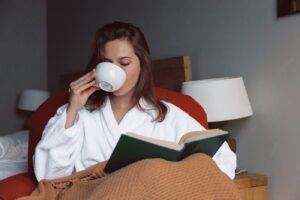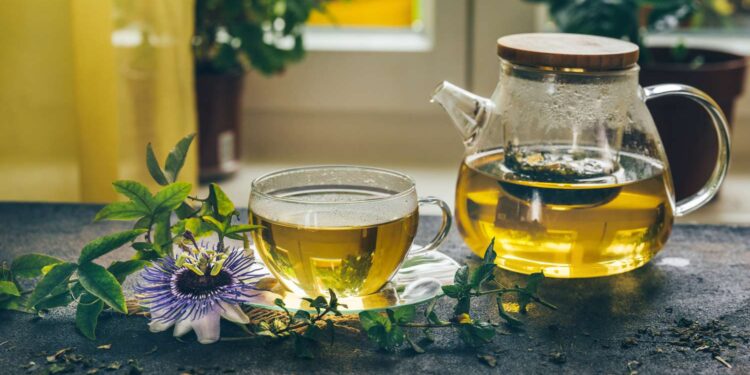Sleep is an essential component of human health, influencing physical recovery, mental clarity, emotional resilience, and overall well-being. In light of increasing sleep disturbances due to modern lifestyle factors such as stress, screen exposure, and irregular schedules, many individuals are turning to natural remedies as alternatives to pharmaceutical interventions. Among these, herbal teas stand out for their accessibility, low risk of side effects, and long-standing use in traditional medicine systems.
This article presents a formal and evidence-based overview of the most effective herbal teas known to support sleep onset and quality, examining their physiological mechanisms and relevant clinical findings.

- Chamomile Tea (Matricaria chamomilla)
Chamomile is one of the most widely consumed herbal infusions worldwide and has long been used as a natural remedy for insomnia and anxiety. Its sedative effects are primarily attributed to apigenin, an antioxidant that binds to benzodiazepine receptors in the brain, thereby exerting mild tranquilizing effects.
Clinical research supports chamomile’s potential efficacy: studies involving postpartum women have demonstrated improvements in subjective sleep quality after chamomile consumption. While not a substitute for clinical treatment of severe insomnia, chamomile tea may serve as a gentle adjunct in managing mild to moderate sleep disturbances.
- Valerian Root Tea (Valeriana officinalis)
Valerian root has been extensively studied for its anxiolytic and sedative properties. It is believed to act by increasing the availability of gamma-aminobutyric acid (GABA), a key inhibitory neurotransmitter responsible for dampening nervous system activity.
Although scientific findings are mixed, several trials suggest that valerian root may reduce the time required to fall asleep and improve overall sleep quality, particularly in individuals with mild insomnia. However, due to variability in formulations and dosages, further standardized research is warranted to determine its full clinical potential.
- Lavender Tea (Lavandula angustifolia)
Lavender is renowned for its calming fragrance and has been used for centuries in both aromatherapy and herbal medicine. When consumed as a tea, lavender appears to exert mild sedative effects, potentially reducing anxiety and improving mood.
In clinical settings, particularly among postpartum populations, lavender tea has shown promise in decreasing fatigue and promoting sleep. Its benefits may be enhanced when combined with a consistent nighttime routine.
- Passionflower Tea (Passiflora incarnata)
Passionflower tea is another herbal remedy traditionally employed to combat anxiety and restlessness. The active compounds in passionflower may enhance the brain’s production of GABA, leading to increased mental relaxation.
Studies suggest that passionflower may be effective in improving overall sleep quality, especially when consumed regularly before bedtime. In some trials, it has also been combined with other natural agents, such as magnesium and melatonin, to maximize efficacy.
- Lemon Balm Tea (Melissa officinalis)
A member of the mint family, lemon balm has demonstrated potential as a mild sedative and anxiolytic agent. As a tea, it is well-tolerated and often used to relieve restlessness and promote emotional balance.
Preliminary studies indicate that lemon balm may reduce symptoms of insomnia and improve subjective sleep quality, although larger-scale research is necessary to confirm these outcomes.
- Magnolia Bark Tea (Magnolia officinalis)
Derived from the bark of the magnolia tree, this tea contains honokiol and magnolol—bioactive compounds thought to influence the brain’s GABAergic system. Magnolia bark is traditionally used in Chinese medicine to reduce stress, support digestion, and promote sleep.
Emerging research suggests that these compounds may help mitigate anxiety and promote deeper sleep. However, clinical trials in human populations remain limited, and further studies are needed to establish dosage guidelines and safety profiles.
- Low-Caffeine or Decaffeinated Green Tea (Camellia sinensis)
Although typically known for its stimulant properties, green tea contains L-theanine, an amino acid associated with relaxation without drowsiness. When consumed in a low-caffeine or decaffeinated form, green tea may promote a state of calm conducive to sleep.
Research indicates that low-caffeine green tea can reduce stress and improve sleep quality, particularly when consumed in the early evening. It is advisable to avoid high-caffeine variants, as these can interfere with sleep latency and depth.

Herbal teas offer a promising, non-pharmacological approach to improving sleep and reducing stress. Chamomile, valerian root, lavender, passionflower, lemon balm, magnolia bark, and low-caffeine green tea have all demonstrated varying degrees of efficacy in promoting relaxation and supporting sleep health.
While these natural remedies are generally safe, individuals with chronic sleep issues or underlying health conditions should consult a healthcare provider prior to initiating any herbal regimen. As part of a comprehensive sleep hygiene routine, herbal teas may serve as both a therapeutic and ritualistic tool in achieving restorative rest.
Source : https://www.eatingwell.com/










